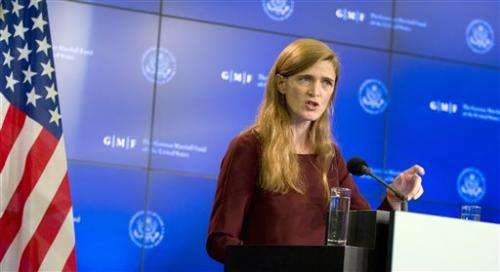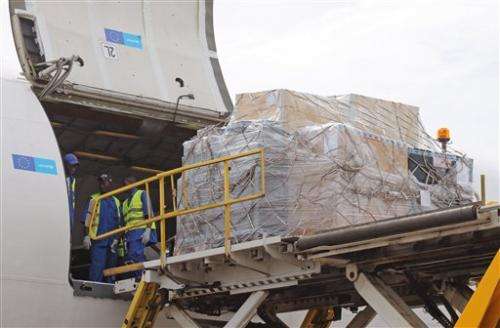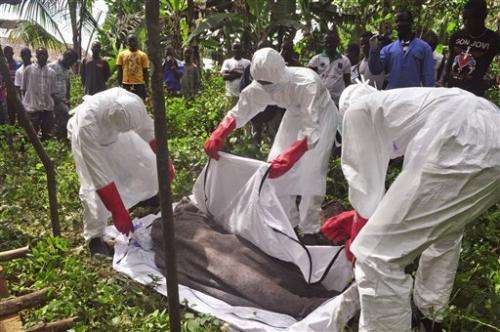A look at latest Ebola developments

No African countries are on the United Nations list of contributors to fight Ebola. With few exceptions, African governments and institutions are offering only marginal support as the continent faces its most deadly threat in years. Pledges to deploy 2,000 African health workers have remained largely that—promises. The epidemic did not even figure on the agenda of a session on peace and security at the Pan-African Parliament in South Africa last week. Angry legislators from Sierra Leone and Liberia said they feel abandoned. Nkosazana Dlamini-Zuma, chairwoman of the 53-nation African Union, said this week at a meeting with the U.N. secretary-general and the World Bank president in Ethiopia that Ebola "caught us by surprise."
A look at the top Ebola developments worldwide Friday:
THE LATEST
Maine health officials have asked a court to limit the movements of nurse Kaci Hickox, who defied a voluntary quarantine for medical workers who have treated Ebola patients. A judge signed a temporary order Thursday limiting Hickox's movement until a further court order expected Friday. For now, police are monitoring Hickox and her public interactions but cannot detain her. The state went to court, following through with a threat to try to isolate her until the 21-day incubation period for Ebola ends on Nov. 10. Fort Kent Police Chief Tom Pelletier went inside the home briefly Friday morning and said afterward, "We just had a good conversation." The legal action is shaping up as the nation's biggest test case yet in the struggle to balance public health and fear of Ebola against personal freedom.
AMBASSADOR RETURNS FROM EBOLA-AFFECTED COUNTRIES
Ambassador Samantha Power says she is self-monitoring for Ebola after returning from a visit to affected countries in West Africa. Power on Friday praised the United States response to the outbreak in Liberia, Sierra Leone and Guinea and called on other countries to do more. Power arrived late Thursday in New York City. She has been openly critical of the quarantine restrictions some U.S. states have struggled to put in place, adding that federal guidelines are sufficient. Power tweeted a photo of herself having her temperature taken at the airport on arrival.
MEANWHILE IN WEST AFRICA
Liberia has opened one of its largest Ebola treatment centers yet in Monrovia, bracing for a new wave of infections even as officials say Liberia is making some progress in containing the outbreak. Aid is now pouring into Liberia and other West African countries hard hit by Ebola. More than 13,700 people have been sickened by the disease, nearly half of them in Liberia.

WHO ISSUES NEW GUIDANCE ON EBOLA PROTECTIVE GEAR
The U.N. health agency is updating its guidelines for health workers dealing with the deadly Ebola virus. The World Health Organization recommends doubling up on gloves and making sure the mouth, nose and eyes are better protected from contaminated droplets and fluids. Doctors Without Borders already recommends some of its staff in high-risk jobs, like cleaning Ebola treatment centers or handling bodies of Ebola victims, wear two or three pairs of gloves.
EBOLA PROTOCOLS VARY

Ebola protocols aren't the same for soldiers and civilians returning from West Africa. The Pentagon says soldiers returning from an Ebola response mission will have to spend 21 days in isolation in a military facility. The policy depends for a returning civilian doctor or nurse who directly treated Ebola patients. The CDC recommends that only people at the highest risk—those who've had direct contact with an Ebola patient's body fluids, for example—avoid commercial travel or large public gatherings for 21 days. Anyone who develops symptoms would be hospitalized immediately. The differences are partly a function of the military's unique role, the constitutional authorities granted to individual states and the federal government's desire not to discourage health care workers from volunteering to help confront the deadly Ebola virus.
EBOLA VICTIM'S FIANCÉE STRUGGLES TO REBUILD LIFE
Louise Troh hoped to be married to Thomas Eric Duncan by now. Instead, she's grieving after his fatal bout with Ebola and trying to help her family refocus on the future. Neither is easy. They are trying to replace their personal belongings that were incinerated when authorities decontaminated the apartment where Duncan stayed. Finding a rental home is proving hard, and Troh blames the stigma of Ebola. Duncan died Oct. 8 of Ebola at Texas Health Presbyterian Hospital Dallas.

© 2014 The Associated Press. All rights reserved.
















